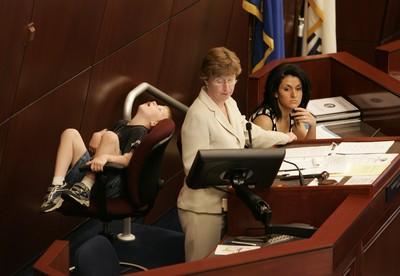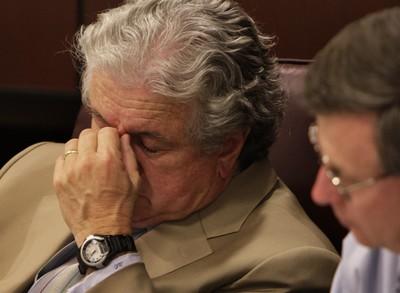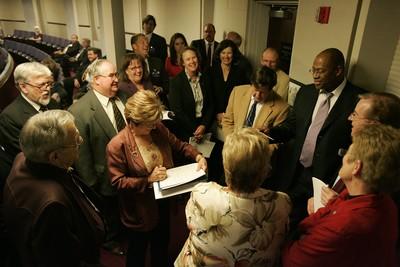Legislators rush to the finish
CARSON CITY -- The Legislature ran out of time today as it attempted to pass the final handful of measures sought in the 2007 session, working past its constitutionally mandated deadline of 1 a.m.
The Senate voted on Assembly Bill 487 at 12:58 a.m., but the Assembly continued to vote, finally adjourning at 1:15 a.m.
"The last three bills may be challenged, but in the end, who cares," said Assembly Speaker Barbara Buckley, D-Las Vegas.
As it began to consider a measure requiring an amendment, the clock ran out. The bill would have paid a bonus to some members of the Nevada National Guard.
Late Monday, Buckley praised members of her house in an end-of-session speech during which she pointed out the improvements legislators made to education, highway construction, prisons and other areas.
"These are not just Democratic bills or Republican bills," she said. "They are Nevada bills."
Among the last bills to squeeze through were measures in both the Democrat-controlled Assembly and the Republican-controlled Senate to fund lawmakers' pet projects, about $10 million worth on each side.
Senate Majority Leader Bill Raggio, R-Reno, noted that such projects get derided as pork spending, "unless you ask the people involved who are the recipients of the funds." He added, "These have value and are worthy projects."
The final day did see some short tempers and anger as tired lawmakers kept trying to get one last bill through.
In the Senate Finance Committee, Raggio slammed the gavel down and halted discussions when Senate Minority Leader Dina Titus, D-Las Vegas, wanted to spend more time discussing the state budget bill.
"We all know what is in here," Raggio said. "Do you want to adjourn today?"
Lawmakers will go home having passed a transportation package that puts an additional $1 billion into highway construction without raising tax rates, a move Republicans call significant progress, while Democrats say it doesn't go far enough to address a funding shortfall the Nevada Department of Transportation puts at $5 billion.
In a move to raise more money for roads, the Assembly tacked a proposal calling for voters to decide in a ballot question whether to increase taxes to pay for road improvements. The proposal, which passed the Assembly on a 27-15 party-line vote, would ask voters in 2008 whether they support raising taxes on truckers, taxicabs and creating toll roads to further address the highway funding shortfall.
"We face a situation in our state where we need to identify transportation funding sources," said Assemblyman Kelvin Atkinson, D-North Las Vegas.
The proposal, placed in Assembly Bill 393, was forwarded to the Senate, where it was expected to die on a party-line vote.
The state budget of just over $7 billion finalized Monday also includes $63 million in new funding for education, with an expansion of all-day kindergarten programs and a pilot project for so-called empowerment schools sought by Gov. Jim Gibbons.
While road funding and transportation were expected to be contentious and require partisan compromise, the 2007 legislative session saw an unexpected controversy in the form of green buildings.
Under a bill passed without fanfare in 2005, companies sought generous tax breaks for building to energy-efficient standards. Lawmakers scaled back those giveaways, but lawsuits might be coming down the pike as a result.
"Some years, there's one issue that dominates" the Legislature, Buckley said as the proceedings wound down Monday, with worn-down legislators who had worked long hours through the weekend. "This year, there was less of that."
Raggio said lawmakers made good progress, even if they left some things unfinished.
"We didn't get everything we'd like to get done, but we addressed as well as we could all of the big issues," Raggio said. "Whatever party you're in, and whatever house you're in, and the governor, reached what I think is a good compromise."
THE BUDGET
The state budget kept tightening on legislators over the course of the session, with the final revenue projections announced in May more than $100 million short of what had been expected.
The $4.4 billion budget bill funding the operation of the state government for the next two years was the first order of business taken up by the Assembly on Monday, which passed out the measure to the Senate on a unanimous vote and without debate.
One program that didn't make it into the final budget was nearly $30 million to implement the Real ID program at the Department of Motor Vehicles. Lawmakers decided instead to take a wait-and-see approach in the event Congress modifies or eliminates the program designed to make every U.S. resident show proof of their identity.
Families getting cash assistance from the state will see a slight bump in their monthly grants, the first increase since 1993. The budget for the Temporary Assistance to Needy Families includes a 10 percent increase, putting the grant for a family of three up to $383.
Foster care parents will see a boost in their rates for taking care of neglected children. The rate will go from the current $21 a day, to $24 in the first year of the budget and to $28 in the second year.
The budget includes a program Gibbons sought to help dropouts earn their GEDs. The Project Challenge program will be operated by the Nevada National Guard at Nellis Air Force Base.
Other budget bills were passed without controversy, including a pay bill authorizing raises of 2 percent in the first year and 4 percent in the second year for state employees, higher education personnel and teachers and other school employees.
The $804 million capital construction program, with a major emphasis on prison construction, also saw final passage. The construction budget includes six major prison projects costing $285 million, or 35 percent of the total budget.
But higher education also made out well, receiving about $99 million to complete a number of projects already under way, as well as another $90 million in state funds for several projects for the Health Sciences System spread out over different campuses.
The last-minute pork projects included $1 million for Opportunity Village in the Senate and, in the Assembly, $1 million for local governments to help the homeless.
Around midnight Monday, the Senate approved a measure that would create a "trigger" to increase the pay of teachers from 4 percent to 4.375 percent in the second year of the budget to cover their share of a retirement contribution increase. Democrats have suggested additional sales tax totaling $12 million will be available to cover the cost as a result of changes to the "green" construction legislation.
The measure had been approved by the Senate Finance Committee and was awaiting action by the full Senate late Monday.
EDUCATION
Education First, requiring the public education bill to be passed before any other funding measure, did not prove to be the barrier to ending the session that lawmakers had feared. It was the first time the constitutional amendment, backed by Gibbons and aimed at preventing last-minute legislative gridlock, was in effect.
The public education budget, passed Friday, contains $2.3 billion in general fund spending, plus $354 million from other sources, for a growing student population and for new programs.
Buckley called the $63 million in new K-12 spending a victory for Democrats. She said Gibbons' original budget contained only $13 million in new education funding.
The education budget includes almost $10 million for an empowerment program in 29 schools around the state, including 16 in Clark County, at a cost of $400 per student.
The program, which Gibbons called his boldest new proposal, aims to put more autonomy at the individual school level, allowing principals discretion in budgeting and curriculum decisions.
Gibbons originally had asked for $60 million to fund 100 empowerment schools.
"A 'one size fits all' education plan will simply not work, and it is time we incorporate innovative ideas into the way we educate our children," Gibbons said in a statement praising final passage of the empowerment schools legislation Monday.
The budget also includes $15 million to establish full-day kindergarten classes in 63 additional schools. Democrats had wanted full-day kindergarten classes in all 340 elementary schools in the state.
Full-day kindergarten is offered in 114 schools, where more than 55 percent of students qualify for free or reduced cost lunches.
The new funding will lower the threshold to schools with 38 percent of the children qualifying for subsidized lunches.
The Clark County School District anticipates getting funding for another 38 schools. There are 199 elementary schools in the district, and 71 currently have all-day kindergarten through state funding.
As passed by the Legislature, the amount spent per pupil by the state will increase from $4,696 in the current school year to $5,122 next year and $5,323 in the 2009-10 fiscal year.
2007 Nevada Legislature
























